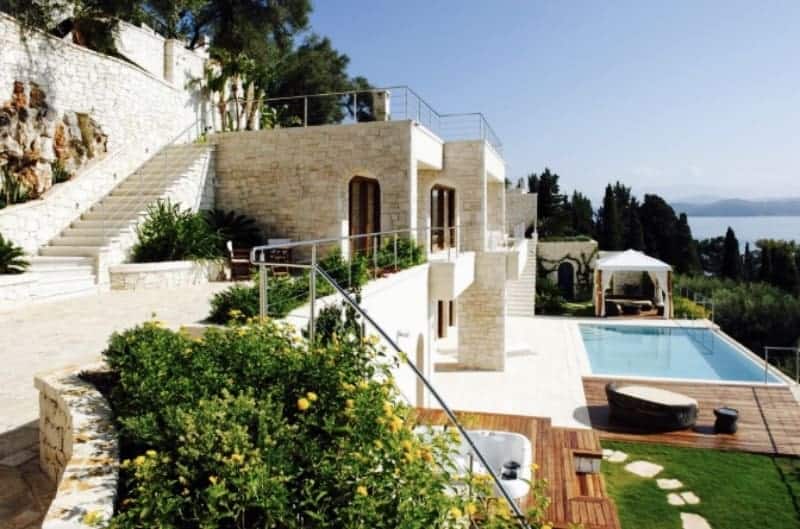
By all accounts, post-war Paris was a heady mix of celebration and survival, politics and philosophy, elegance and radical energy. As it was a pressure cooker with the lid finally off, Parisians let off steam and set the stage for the rejuvenation of a world city par excellence. Savvy entrepreneurs got in on the act of course, especially foreigners. Yankee GIs stationed in Paris as well as bohemian artists and writers snapped up lodgings, squats and apartments that were going for a song. You could say the same about Berlin when the Wall fell in 1989. An optimistic, but somewhat shell-shocked metropolitan city was ripe for international property investors, whose shrewd gamble paid off big time. The dour Berlin of the cold war period became a hip town filled with creatives, finding plenty of affordable accommodation to their liking.
Now in its sixth year of crippling economic crisis, could Athens – and Greece in general – provide the same sort of real estate opportunities as Paris and Berlin after the War ended and the Wall collapsed?
Let’s look at the facts.
Greek real estate prices started tumbling soon after the crisis began in 2009. A period of artificially inflated prices rode the economic boom of the early 2000s until austerity bit into the incomes and savings of a prosperous middle class. By 2012 for instance, an inner-city Athens apartment (one or two bedroom depending on locale) bought for €120,000 in 2006, was valued at €60,000. In Australian dollars that’s less than $200,000 in its heyday, and half that now. A general rule of thumb for the new market values is: take the 2005 price and divide by 2. In other words- a deposit for Sydney real estate will almost get you an apartment outright today in Athens! Weird but true.
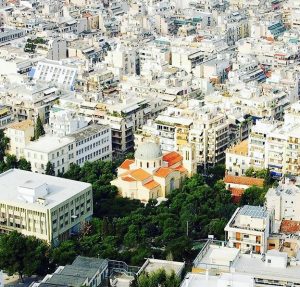
Rental costs naturally also fell, but not to quite the same degree (something to take note of).
With Greek investment looking like anything but a sure bet, and people desperate for cash to pay bills, loans and taxes, the market today has been at its lowest ebb for the last four years. It’s highly unlikely, however, that things will stay that way: the modest prices in themselves have provoked interest throughout Europe, and the last year has witnessed a small but discernible bounce upwards. Even more interestingly though, high youth unemployment, a simmering amalgam of despair and pent-up creativity has produced a city buzzing with grass roots art, music and politics, attracting longer term visitors such as artists and academics (next year’s prestigious “Documenta 14” biennial is to be held in Athens).
The bohemian epicentre of Athens for instance – the Exarcheia area, which has been described on Airbnb as “one of the best neighbourhoods in the world – what Greenwich Village was in the 1950s” – is ripe for investing in, with loads of small to medium apartments for sale. Frequent or longer term visitors to Athens – second or third generation diaspora Greeks or European urbanites with a love for one of Europe’s more unruly capitals – might find a small city apartment to suit their purposes, and worthwhile buys can be had from anywhere between €15,000 and €100,000 at present (and way upwards of course – is there ever a limit?).

The more adventurous among them might choose Exarcheia or the increasingly trendy Kerameikos/Gazi area, full of bars, cafes and theatres. If you want a little more bobo than boho, Ano Petralona/Filopappou and the charming Thisseion could be for you, but if you want posh or maybe just neatly respectable enclave, Kolonaki or Pangrati, respectively, would do the trick. All of the above are an easy walk from the city centre and its cultural/archaeological sites and museums. The cream of the crop is of course Plaka and the area around the Acropolis area, but bargains are harder to find there.
If the urban life and an Acropolis view is not such an attraction for you – maybe you want to periodically get away from a depressing winter, or you’re a young Greek Australian family interested in an Athens base – the seaside is probably the place to be. Accessed by bus or the coastal tram, the Athens Riviera stretches from Delta Falirou, which hosts the spectacular new Stavros Niarchos Cultural Center.
Now to the southernmost point of Attica, Cape Sounion- depending on your pick of locale, you can find everything here from the vibrant nightlife (the whole city is famed for) and exclusive shopping, to sandy beaches fringed by seafood taverns or rocky coves for swimming in cool waters. Faliros and Alimos are good choices for a seaside breeze and water views within easy distance to the centre, but for the even more suburban yet aspirational types, glitzy Glyfada has options, albeit a little pricier (well, at least until you start comparing them to Sydney water views!).
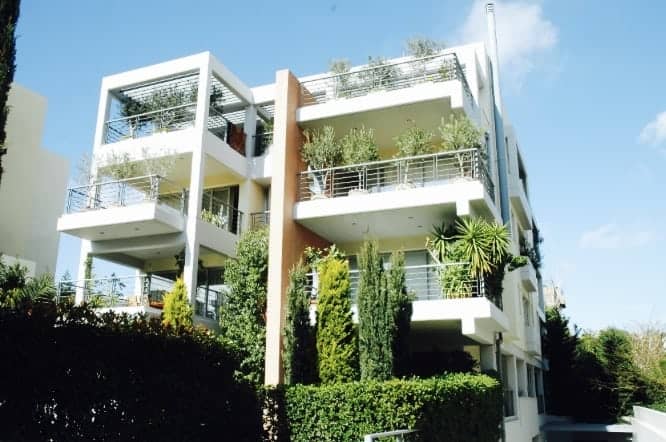
If you’re more interested in investment than an Athens pad, any of the aforementioned options would work equally well. The market shows signs of moving and while it may take a while to reach its pre-crisis levels, you can be pretty certain that anything you buy now has little room to move anywhere but up. But rather than just buy an investment and wait for it to appreciate, some business people are also seeing potential in neglected but charming old apartments and concentrating their efforts on sprucing them up, with either a view to sell at profit even in the current climate, or to attract the “right sort” of tenant.
Standard rental returns start at 5 percent, however, they can go considerably higher if you chance upon a bargain buy – of which there are more than a few, due to taxation and debt burdens. A neat little apartment at a bargain price can potentially return you as much as 10 percent. It is worth noting at this point that although rental costs have also gone down, and in many cases landlords have also reduced the rents of existing tenants, they have not quite kept pace with the fall in real estate prices, being still about two thirds at least of pre-crisis rental costs, as opposed to little more than half as is the case with sales. (It’s important to note, too, that stamp duty is relatively low.)
Of course, you could always combine business and pleasure! You may want an Athens base AND an income?
If logistics are a problem when you’re far away in Chicago or Melbourne and your cousins are busy, a good agent, can facilitate short-term tourist rentals that could cover any maintenance costs and more, like property taxes, including ENFIA.

Greece’s ‘second’ city Thessaloniki is also worth investigating as a place to invest. On a more manageable scale, it also combines history and seaside, has ‘bargain potential’, and furthermore, is a gateway to the Balkans.
If the city is not your idea of a holiday and you want a rural or seaside retreat, Europeans have been paving the way for decades, followed more recently by Russian buyers, who know a bargain when they see it.
The islands and the countryside of Greece have something for every taste and every need, and as the bounce back up looks set to continue, the next two years are probably the time for aspiring investors to nail a bargain. Islands close to the port of Piraeus (Aegina and Salamina) are much sought after, given proximity to the capital so it’s worth looking further afield. Islands in the Cyclades and Dodecanese have white washed treasures in need of some restoration but which could be bought for between A$100 000 to $500 000.
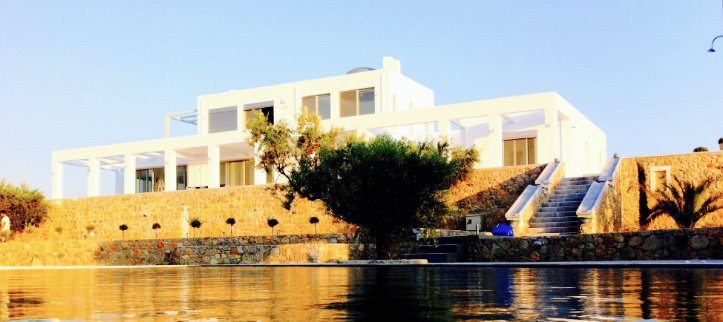
The Mani region, Crete and Pelion have been firm favourites with Europeans for many years, whereas those who care more about cutting a stylish figure than they do about exploring the countryside, still favour Santorini and Mykonos for designer homes. Off the beaten track though, or on the less famed islands, there are extraordinary bargains to be had – traditional stone village homes can be bought for €10,000, but be prepared to spend at least that much again on restoration, and steel yourself for red tape and tradesman angst galore, if you choose to go down that path. Unless you have time, money and determination to spare, you’re better off spending a bit more and acquiring an island or country home that’s already renovated. Alternatively, small coastal towns often have beachside apartments – they might not be the ultimate dream of a holiday retreat but they still have a lot to offer, especially if you can just stroll downstairs for a lazy day at the beach, followed by a late lunch of calamari and ouzo on your doorstep.
Let me finish on a personal note. Recently I bought into the market. Why did I buy into Greece during the crisis? Was I mad? Actually no, it was the best financial decision I have ever made.
I found private sales purely by strolling around the city and keeping an eye out for the ubiquitous yellow stickers plastered at the doorway of apartment blocks that advertise sales or rental opportunities.
I also researched online to get an overall view of what was available comparing prices.
Having inspected about 10 places, I took note of the condition of the buildings and the apartment itself. I found talking to the actual owner insightful rather than rely on an agent eager for his/her commission.
Once I committed to the buy I hired a lawyer who worked in conjunction with a respected notary to process the paperwork. An accountant did the sums and informed me of ongoing costs, which were minimal. The only pitfalls I encountered came from the buyers who had financial problems of their own making, but that got sorted out over time. Within 6-8 weeks the transaction was complete involving bank transfers and the payment of stamp duty (which was approximately 8-10 % of the sale price). I immediately found tenants with a return of 10% on my investment (I could also Airbnb it at a later stage and keep it freed up for any visit to Greece). A long term tenant is consistent income, but I am aware that tenants have certain rights and you just can’t kick them out on a whim like you can in Australia. All in all- it was not a fraught experience and whilst there is red tape to deal with, nothing is insurmountable. Finally, there is much angst over the ENFIA tax but this is overstated. Expect to pay 200-300 euro a year depending on the size of dwelling you acquire, just get a reliable accountant to facilitate it.
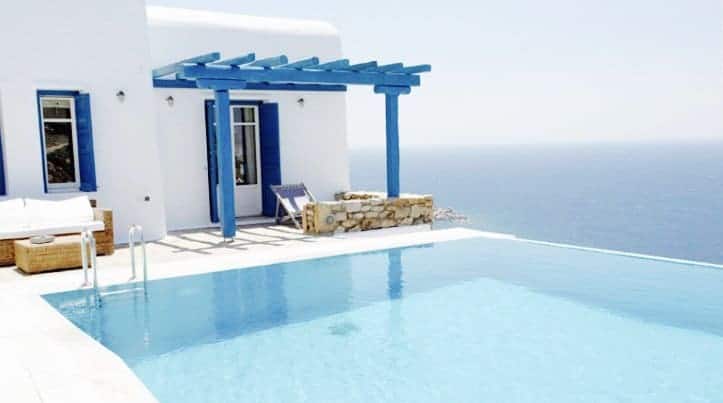
WHY BUY IN GREECE →
- Cultural connection
- History and Archaeology
- Music
- Nightlife
- Personal connection
- Family background
- It just “does it” for you
- Island dreams
- Whitewashed Aegean houses
- Spectacular views
- Pristine beaches
- Lush Ionian islands
- Neoclassical port towns
- Provincial hideaways
- why go to the French countryside when the Peloponnese, rural Crete or Pelion beckon
- Investment opportunity
- Short-term or holiday rentals
- Long-term rentals
- Renovations
- Anticipation of market recovery
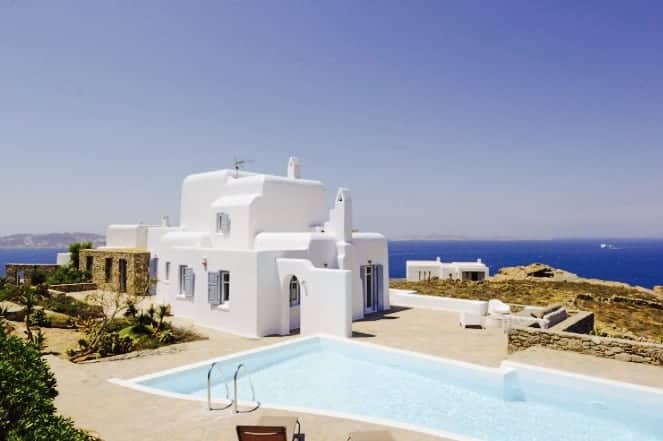
HANDY TIPS FOR BUYERS →
- Property in Greece is commonly sold both privately and through agents.
- Some of the best bargains are private sales.
- Agents charge a buyer’s fee, therefore private sales have merit.
- Whether you are using an agent or dealing directly with the seller be sure to use a thorough and trustworthy lawyer of your own.
- It is not unusual for properties to have legal issues or to be encumbered in some way. Your lawyer needs to do thorough checks and resolve any problems for you – or inform you if it is not possible to do so.
- A Greek bank account would facilitate payment, bank cheques being a preferred payment method, but with capital controls, these can be hard to come by. Alternative methods can always be found, such as a direct electronic transfer.
- Your lawyer and notary should be able to provide you with taxation advice. Stamp duty rates are reasonable and depend on a number of factors.
- If you are buying with a view to renting the property, expect a potential rate of return between 5 and 10 percent
- If you are looking to purchase in absentia, a reliable agency that understands your needs is essential.


I have two 3 bedroom apartments and a one bedroom studio apartment for sale in Ano Glyfada situated on a corner lot. Newly built units only 3 years old. Any opinion on how to price them? Any takers send me an email.
Excellent article. Can you refer a good lawyer or accountant (that can speak English) and if not, do you have any tips on how to find these? Many thanks.
Great article...appreciate the information.